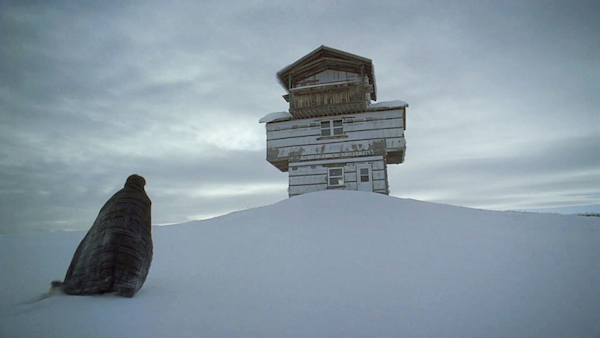Movie review by Greg Carlson
“Goodnight Mommy” filmmakers Veronika Franz and Severin Fiala continue to carve up chills, thrills, and nightmares in “The Lodge,” a Sundance 2019 favorite finally receiving the theatrical release it rightfully deserves. With an unrelentingly oppressive atmosphere in the claustrophobically framed location of the title, “The Lodge” is perfect slow-burn arthouse horror that never cheats and always rewards the patience and intelligence of the viewer. Accordingly, jump scares are mostly banished in favor of a psychological head trip that hides the dread in plain sight and lingers long after the lights come up. The less one knows about the film the better, and woe to the many reviewers who have already revealed too much.
Like Ari Aster’s “Hereditary” and “Midsommar,” “The Lodge” explores familiar experiences of trauma through the lens of horror. In this case, the particular facet of grief is a painful divorce that unravels the children of Richard (Richard Armitage), a journalist who has, perhaps inadvisably, fallen in love with his subject Grace (Riley Keough), the sole survivor of a fanatic doomsday cult’s mass suicide. With that bloody red flag firmly planted, Richard’s kids Aiden (Jaeden Lieberher) and Mia (Lia McHugh) understandably want absolutely nothing to do with the strange intruder threatening to replace their mom Laura (Alicia Silverstone, making every moment count).
In a set-up worthy of Shirley Jackson or Rod Serling, a planned Christmas holiday at a remote cabin trades comfort for panic when Richard leaves Grace alone with the children for a few days. With all the necessary two-way animosities well-established, it is only a matter of time before the past comes calling on the present. The carefully constructed back-and-forth fuels the core of “The Lodge,” and Franz and Fiala improve on the themes they established in “Goodnight Mommy” by manipulating audience sympathies between the children and their stepmother-to-be, who take turns as antagonist and protagonist in seesaw balance.
The straightforward brilliance of the movie’s premise allows two equally plausible explanations for the unsettling occurrences unfolding before our eyes. The scenarios compete for logical primacy in the viewer’s mind. Grace’s sinister past, rendered via indications that she must work very hard to function with a degree of self-control and a sense of safety, provide her with a motivation equivalent to the expression of anger and frustration expressed by Aiden and Mia. All the performances are true, but Keough is especially riveting.
Franz and Fiala beautifully capture the film’s locations. Interiors are a set of rooms so deceptively simple that the prowling camera is all it takes for us to begin projecting our own visions on the chilly spaces. Winter’s icy presence can be felt outside as well as inside, and in both realms the compositions arrestingly juxtapose the long shot with the close-up, disorienting us in parallel to the mounting anxiety. “The Lodge” has already drawn comparisons to “The Shining,” which does share a preoccupation with eroding mental health via the metaphor of isolation and cabin fever. But Franz and Fiala scale down Kubrick’s more expansive vision, and the result offers its own kind of skin-crawling satisfaction.
